Balancing the Books After Years of Neglecting Schools
The Texas Legislature wants to fix school finance, but how?
By Richard Whittaker, Fri., April 7, 2017
Ever put off until tomorrow what you could have done today? Of course you have. You've put the milk back in the fridge on its expiration day. You've left the house with just enough gas to get there, but maybe not enough to travel back. That's how Texas lawmakers have treated the state's school finance system, and now even the chair of the House Public Education Committee has issued its warning: Without reform, school districts will be forced to close.
Put the blame where it belongs: the Texas Supreme Court. To the surprise of just about everyone, including, in all likelihood, many state attorneys, the justices last year issued a bifurcated ruling on school funding after years of challenges. The good news for education activists was that the court agreed, as Chief Justice Don Willett wrote: "Our Byzantine school funding 'system' is undeniably imperfect, with immense room for improvement." The bad news: While the justices concurred that the state's system is a complicated embarrassment, they also agreed that it still meets the minimum standard required by the Texas Constitution. So while justices advised lawmakers to make changes, they did not dole out any orders. Moreover, by setting a surprisingly low constitutional requirement for the state, the court may have crippled any future lawsuits. Dax Gonzalez, governmental relations communications manager for the Texas Association of School Boards, said justices "made it a lot harder for any future plaintiff to challenge the school finance system."
This dysfunctionality does not come as news to Texas state lawmakers. Last session, House Public Education Committee Chair Jimmie Don Aycock, R-Killeen, authored House Bill 1759, the closest the state has come to an omnibus school finance reform bill since the last major rewrite in 2006. Not only did it call for adding $3 billion from the Economic Stabilization Fund (better known as the Rainy Day Fund), but it proposed systemic changes to the weights by which districts get more cash for forecastable educational expenses, such as teaching kids with dyslexia, or English-language learners. The bill also suggested changes to the Cost of Education Index, which adjusts payments dependent on local expenses like property values. Those metrics haven't been revised since 1990, and contain outdated presumptions like an Austin education costing the same as one in Killeen (and less than one in Round Rock). HB 1759 ultimately failed – in no small part because many lawmakers felt it was prudent to wait for the Supreme Court's ruling.
The good news today is that, even without court pressure, both the House and Senate agree that there must be some effort made to improve state school finance. Underlying everything is the core budget, and there's some bad news in Senate Bill 1, the upper chamber's drafted proposal. When senators unanimously approved it on March 28, Senate Finance Committee Chair Jane Nelson, R-Flower Mound, claimed it would add $4.6 billion into school finance, including $2.6 billion for enrollment growth. But some smoke and mirrors might be in play; the Senate's proposal depends on recapture payments extracted from supposedly "property-rich" districts to balance the books. Take that out, and the state's contribution actually drops by $1.8 billion. That extra burden on local taxpayers may seem hypocritical, since one of Gov. Greg Abbott's signature pieces of legislation this session is SB 2, hobbling the ability of municipalities to raise taxes to cover their own bills.
Amplifying the damage from the Senate, Lt. Gov. Dan Patrick has thrown down another ultimatum about school vouchers. The proposal in SB 3 is not a flat-out voucher in the narrowest sense. Instead, it's a two-part tax dodge, creating tax credit scholarships, whereby businesses will be able to funnel a portion of their state business taxes into scholarship fund contributions (an idea killed by the House in 2015), plus Education Savings Accounts, handing up to $9,000 a year in school funding to families for educational expenses. Critics note how the $9,000 won't be enough for poor kids to pay for private school, but will help subsidize such educations for wealthier families. The proposal is opposed by a broad coalition of education groups, including teachers' unions Texas AFT and the Texas State Teachers Association, Texas PTA, and the Texas Association of School Boards. Gonzalez called TASB's opposition "unequivocal"; vouchers "take taxpayer dollars that are extremely transparent," he said, "and then put them behind a cloak of secrecy in private schools or home schools."
Sen. Kirk Watson, D-Austin, said SB 3 may already be on life support. It passed through the Senate on March 30, with little debate – mainly, Watson said, because "it's so DOA that senators don't even want to bother to talk." As with previous sessions, the House has no interest in its passage. Watson suspects the bill was only filed "so that some people can check a box and say they voted for it, and blame other people for not passing it."
Sanity in the House
The closest Texas schools will get to a lifeline should come from the House, where Speaker Joe Straus has declared school finance reform and improvement a priority issue. The main vehicle will be HB 21, authored by Rep. Dan Huberty, R-Houston, Aycock's successor as Public Education chair and one of the most determined of the pro-public education Republicans. Huberty said that he took to heart the court's ruling that "while the school finance system is constitutional, it's barely constitutional," and is continuing with changes even without the legal gun held to his head. When Huberty first introduced HB 21, his plan broke into three basic elements:
• Increase the basic allotment from $5,140 per student to $5,350 through extra funding for high schools and nonprofessional staff, and a new transportation fund;
• Reduce the total amount of recapture statewide by $355 million for the biennium;
• Increase the weighting for students with dyslexia.
Initially, Huberty put a $1.6 billion price tag on these changes, and proposed using the Rainy Day Fund to cover the cost. But this was the starting point, not the end. When HB 21 left the House Public Education Committee on March 28, it had even more fixes in place. In addition to the revised dyslexia weighting, there's now a slight increase for bilingual students, and an increase and expansion of the career and technology weighting, which will also reintroduce computer science courses in middle schools. Huberty called this the first holistic change to the school finance formulas in three decades, "versus just putting more money into the equation, which is what we've done previously."
The committee is putting funding in place to pay for these changes, with Huberty's initial $1.6 billion ask now closer to $1.9 billion. House Appropriations Committee Member Donna Howard, D-Austin, called it "a step in the right direction. ... It's actually more money, and that's good, because we have a lot of catching up to do." For Watson, that's the big advantage of the House proposal over the Senate's. "HB 21 puts money into public education. SB 3 takes money out," he said.
Similarly, Louis Malfaro, president* of statewide educators' union Texas AFT, is broadly supportive of both the intention and results of HB 21, while condemning SB 3 as backdoor privatization. For him, the difference between the House and Senate proposals sum up the differences between the leadership of the two chambers. "Joe Straus is a carpenter, and Dan Patrick is a jackass," Malfaro quipped. "Any jackass can kick down a barn, but it takes a carpenter to build one."
That said, HB 21 is no cure-all. It does not even go as far as Aycock's 2015 measure, which proposed $3 billion in additional funding. While critics may see the shortfall, Huberty warned that if nothing happens, districts could stand to lose roughly $140 per kid this year. "If we don't do a school finance bill, you will have school districts that will close," he said. "That's a fact. That's indisputable."
Yet just as HB 21 expanded in committee, Huberty described it as phase one of a multiyear reform. He said, "The intention was never to try to do the complete overhaul of the system in one session. That's just impossible, resources-wise." That has left important challenges, such as the CEI, on the table, but Huberty said they will not be ignored forever: "We've studied that, we've looked at that, and that's a couple of billion dollars of a fix that has to be done. That will be one of those [that I will] come back and look at it again next session. So that's phase two."
Austin's "Independent" School District
Huberty's plan bails out a sinking ship, but he knows some of the decks are already deep under water. Because his hands are tied by available cash and available time, Austin parents and teachers shouldn't get too excited. If the latest calculations for Huberty's bill hold, the Austin Independent School District would only stand to gain an extra $10 million per year from the state – basically a rounding error in the district's $720 million operating budget. Ken Zarifis, president of local employees' union Education Austin said that while he's happy to receive any extra dollars from the state, "we're so behind the 8-ball when it comes to school finance."
The big issue for AISD, of course, is the notoriously dysfunctional recapture system, quaintly dubbed Robin Hood. Like the mythical English folk hero, the idea that Texas' school finance recapture system takes from the rich and gives to the poor is a pretty story – that's it. In fact, Robin Hood stipulates that the state take from so-called "property-wealthy districts" like AISD – known in technical parlance as Chapter 41 districts – and put that cash into general revenue. If Texas were looking for a more suitable figure in British folklore, it should consider Sir Guy of Gisborne, the sheriff of Nottingham's tax collector and scourge of the poor.
Even though he was Zarifis' predecessor at Education Austin, Malfaro has a slightly different perspective – not least because recapture is one of the few mechanisms keeping the poorer districts afloat. For him, the Robin Hood bait-and-switch is not the dominating problem with Texas' school finance system, but rather emblematic of a bigger problem with school finance. "It's got out of kilter," he said.
It's the same story with the weights and CEI: They almost worked when they were passed, but there have been no meaningful repair efforts, and the dysfunction has accelerated.
The worst example of this dysfunction may be the margins franchise tax, effectively a levy on the gross receipts of every business in Texas. The system was overhauled in 2006, in the wake of the last time Texas lost a school finance lawsuit, and was intended to fill the hole created by the new limit on property taxes. When the tax swap was devised, lawmakers opened a $14 billion hole in their bank accounts. The revised franchise tax was initially predicted to raise $8 billion a year: by 2010, that was revised down to $6.4 billion, and final collections were only $3.9 billion. Moreover, the framework was so lopsided that it placed a disproportionate burden on small businesses, and required businesses to pay even if they made a loss. The end result was a peculiar mix of producing too little, and taking too much, all at the same time.
Predictably, the conservative Republican response has been to cut the franchise tax, rather than fix it or develop a replacement. Last session, lawmakers approved a 25% rate reduction; this time, Sen. Nelson has authored SB 17, a complicated mechanism intended to completely eliminate it. Under its terms, if the comptroller certifies that state revenue has increased by more than 5% in a biennium, half of the excess will go to reduce the franchise tax. Nelson, who aims to completely eliminate the tax within a decade, has managed to get the bill out of the Senate, and over to the House.
That's frustrating for Howard, because the 2006 change that developed the franchise tax wasn't an arbitrary legislative creation. It was the result of a bipartisan blue ribbon commission, appointed by former Gov. Rick Perry, headed by former Comptroller John Sharp, a Democrat, with the involvement of 24 industries. Howard reminded: "They came up with this proposal, they signed off on it, and it was supposed to be something we could all agree on." That was long ago enough that it's now just seen as an unfair business tax, rather than an underperforming component of school finance. "There's only 30-some of us in the House that were here when that vote was taken," said Howard. "So there's a lack of connection to that effort."
Just as the franchise tax hits small businesses the hardest, and even forces companies losing money to pay up, Robin Hood doesn't actually take into account how much it costs to run a district. In AISD's case, recapture payments have skyrocketed from $109 million in 2008 to $266 million in 2016, to a forecast of $807 million by 2021. That's $3 billion in Austin property taxes headed to the state over the next five years, and it comes after the state's own contribution to school spending statewide has dropped – from over 50% two decades ago to only 37% now. For some individual districts, such as AISD, that number is closer to 35%. Howard has filed House Joint Resolution 27, requiring the state to get back over that 50% threshold for maintenance and operations costs, but that optimistic measure has yet to even receive a hearing.
Meanwhile, lawmakers have placed increasing operational burdens on the backs of school districts. While Texas has some of the worst per-student funding in the country, we also have some of the highest and most expensive testing requirements, far above federal minimum levels. At the moment, the state has no clear idea exactly how much this costs, beyond the four-year, $280 million administrative contract with Educational Testing Services. Estimates from the Save Texas Schools Alliance place the actual cost – including prep time – at over $9 billion, but there remains no official calculation. That's why Rep. Jeff Leach, R-Allen, has filed HB 1336, which would require districts to report what test prep and taking really costs. And Rep. Diego Bernal, D-San Antonio, has filed HB 186, calling for a study to finally examine the additional expenses for educating students from economically disadvantaged homes, and English-language learners. Texas AFT's Malfaro said, "Nobody's really talking about the kind of education spending we need to get the kind of education we want."
Federal Cash in the Classroom
It's not just the state that Texas schools have to worry about. Last month, President Donald Trump released his draft of the 2017 federal budget. The backbone is a $54 billion increase in military spending. Where does he expect to raise that cash while still forcing a tax cut? At least partially by slashing school finance. Under Trump's proposal, the Department of Education would face a 13.5% cut in appropriations, or $9.2 billion. As always, the targets are educators (a $2.4 billion reduction in teacher training grants) and poor students ($1.2 billion out of after-hours programs and summer school funding, plus dramatic cuts to programs helping low-income students get into and stay in college). And just like Patrick, Trump wants to dump public money into private hands through federal support for vouchers.
For Education Austin's Zarifis, those federal cuts are as worrying as whatever damage the Legislature may wreak, because those federal dollars are so targeted. "We're running on such a slim budget," he said. "It just takes a little bit to help what we do or hurt what we do. And in terms of teacher training or afterschool programming, a cut can be devastating." AISD currently claims a turnover rate of teachers around 15% each year. That means 800 new teachers, many making their first real jump from the theoretical and guided experience of college to running a real classroom. If the feds cut that training funding as planned, the district will have to pick up the costs for around 200 of those 800 teachers – digging AISD into a deeper financial hole with no real support from the state. That means less cash in the classroom, making the job tougher for new teachers, which means they will be more likely to leave, and new hires will need more training. Similarly, if charter schools can provide afterschool programs and regular school districts can't, Zarifis said, "That becomes a singular issue for why people move."
Yet the core financial fight remains between the Texas House and Senate, and so far the only chamber to put forward concrete reforms is the House through Huberty's bill. The great fear among education advocates is that the Senate will demand a quid pro quo, swapping passage of SB 3's vouchers for HB 21's reforms. That could get ugly, because Patrick opposes the kind of Rainy Day Fund spending Huberty's bill demands, while Huberty has made it clear that a voucher bill would get short shrift in his committee.
Huberty remained optimistic that fight can be avoided – not least because HB 21 includes some terms, such as transportation funding for charter schools – that could placate the school choice movement. He said, "All I can do is get the policies out of the Public Education Committee, get them through the House, and we'll have a discussion about whatever bill they send over to us."
The Impact of Recapture

An earlier version of this article misidentified Louis Malfaro as secretary-treasurer of the Texas American Federation of Teachers, a position he held from 2010 to 2015. He was appointed president in 2015.
Got something to say on the subject? Send a letter to the editor.














